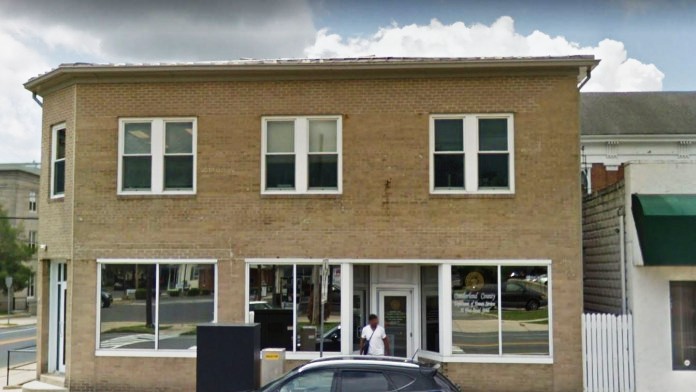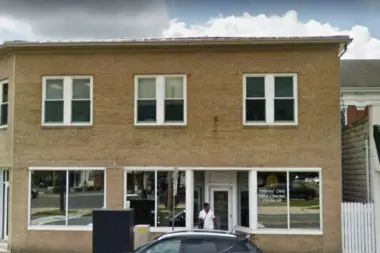About Cumberland County First Step – Alcoholism and Drug Abuse
At the Cumberland County First Step Clinic in Bridgeton, New Jersey adults and adolescents receive evidence-based care tailored to address substance use and co-occurring mental health challenges.
This flexible outpatient program is part of a county-wide effort to reduce substance use disorder and promote a healthier community through focused prevention and treatment support. First Step Clinic sits on West Broad Street, a few blocks west of Potter’s Tavern and south of the Old Broad Street Presbyterian Church and Cemetery.
The clinic is also a short walk northwest of both the Cohanzick Zoo and Bridgeton City Park. Being centrally positioned near local landmarks underscores its role as a trusted presence in Bridgeton’s recovery landscape. They serve men, women and children of Cumberland County and surrounding communities regardless of unique circumstances or challenges. This includes LGBTQ+ members, those living with HIV/AIDS and people involved in legal troubles.
Dedicated Support for Teens and Adults in Bridgeton
Dedicated support is available for adolescents aged 12 to 17, centered on helping them navigate peer pressure through age-appropriate therapy, family involvement and skill-building for long-term resilience.
They also offer specialized anger management programs for adults, with an emphasis on conflict resolution, stress management and emotional self-regulation. What’s especially helpful is that services are offered on a sliding fee scale based on your income and family size. This not only keeps costs low but also ensures no one is turned away due to financial hardship.
Flexible and Integrated Support For Long-Term Success
The expert team in this clinic can guide you toward whole-person wellness via an integrated care model if you’re facing substance use challenges and co-occurring mental health issues. Recovery begins with a diagnostic intake assessment that helps shape a personalized recovery plan to ensure tailored support throughout your journey. You’ll then receive therapy either through standard outpatient sessions or a more structured Intensive Outpatient Program (IOP) for targeted support based on your needs. Emphasis is on building practical sober skills and robust relapse prevention mechanisms to support lasting sobriety.
At the same time, skilled psychiatrists may guide you through evaluation and medication management to tackle co-occurring mental health issues and strengthen emotional well-being. Urine drug screening may be randomly conducted to monitor progress and compliance with treatment guidelines. Your care team may link you to county or community resources to navigate needs like medical care, employment, transportation and other essentials that foster stability as you move forward.
First Step Clinic also offers early intervention services which may involve substance use education classes that encourage healthier decision-making and help prevent the progression of use into addiction. Since these are all county-run programs, they may satisfy the requirements for court-mandated assessments, education and treatment.
Rehab Score
Gallery


Other Forms of Payment
Medicaid is a state based program that helps lower-income individuals and families pay for healthcare. Medicaid covers addiction treatment so those enrolled can use their coverage to pay for rehab. When a program accepts Medicaid the client often pays very little or nothing out of their own pocket.
Self-pay involves paying for treatment out of your own pocket. You can use savings or credit, get a personal loan, or receive help from family and friends to fund your treatment. If you don't have insurance or your insurance plan doesn't cover a specific program, self-pay can help ensure you still get the care you need.
Sliding scale payments are based on a client's income and family size. The goal is to make treatment affordable to everyone. By taking these factors into account, addiction recovery care providers help ensure that your treatment does not become a financial burden to you or your family, eliminating one barrier to care.
Addiction Treatments
Levels of Care
Outpatient Programs (OP) are for those seeking mental rehab or drug rehab, but who also stay at home every night. The main difference between outpatient treatment (OP) and intensive outpatient treatment (IOP) lies in the amount of hours the patient spends at the facility. Most of the time an outpatient program is designed for someone who has completed an inpatient stay and is looking to continue their growth in recovery. Outpatient is not meant to be the starting point, it is commonly referred to as aftercare.
Intensive Outpatient programs are for those who want or need a very structured treatment program but who also wish to live at home and continue with certain responsibilities (such as work or school). IOP substance abuse treatment programs vary in duration and intensity, and certain outpatient rehab centers will offer individualized treatment programs. Intensive Outpatient treatment at Cumberland County First Step - Alcoholism and Drug Abuse sessions are offered three days a week for about 3 hours.
Completing a drug or alcohol rehab program shouldn't spell the end of substance abuse treatment. Aftercare involves making a sustainable plan for recovery, including ongoing support. This can include sober living arrangements like halfway houses, career counseling, and setting a patient up with community programs like Alcoholics Anonymous (AA) or Narcotics Anonymous (NA).
Treatments
The goal of treatment for alcoholism is abstinence. Those with poor social support, poor motivation, or psychiatric disorders tend to relapse within a few years of treatment. For these people, success is measured by longer periods of abstinence, reduced use of alcohol, better health, and improved social functioning. Recovery and Maintenance are usually based on 12 step programs and AA meetings.
Drug rehab in New Jersey is the process of addressing the complex issues involved with addiction. Challenges are identified and addressed through individual and group counseling. Participants learn how to manage these issues without the use of substances.
Opioid rehabs specialize in supporting those recovering from opioid addiction. They treat those suffering from addiction to illegal opioids like heroin, as well as prescription drugs like oxycodone. These centers typically combine both physical as well as mental and emotional support to help stop addiction. Physical support often includes medical detox and subsequent medical support (including medication), and mental support includes in-depth therapy to address the underlying causes of addiction.
Substance rehabs focus on helping individuals recover from substance abuse, including alcohol and drug addiction (both illegal and prescription drugs). They often include the opportunity to engage in both individual as well as group therapy.
Programs
Adult rehab programs include therapies tailored to each client's specific needs, goals, and recovery progress. They are tailored to the specific challenges adult clients may face, including family and work pressures and commitments. From inpatient and residential treatment to various levels of outpatient services, there are many options available. Some facilities also help adults work through co-occurring conditions, like anxiety, that can accompany addiction.
Young adulthood can be an exciting, yet difficult, time of transition. Individuals in their late teens to mid-20s face unique stressors related to school, jobs, families, and social circles, which can lead to a rise in substance use. Rehab centers with dedicated young adult programs will include activities and amenities that cater to this age group, with an emphasis on specialized counseling, peer socialization, and ongoing aftercare.
Clinical Services
Research clearly demonstrates that recovery is far more successful and sustainable when loved ones like family members participate in rehab and substance abuse treatment. Genetic factors may be at play when it comes to drug and alcohol addiction, as well as mental health issues. Family dynamics often play a critical role in addiction triggers, and if properly educated, family members can be a strong source of support when it comes to rehabilitation.
Group therapy is any therapeutic work that happens in a group (not one-on-one). There are a number of different group therapy modalities, including support groups, experiential therapy, psycho-education, and more. Group therapy involves treatment as well as processing interaction between group members.
In individual therapy, a patient meets one-on-one with a trained psychologist or counselor. Therapy is a pivotal part of effective substance abuse treatment, as it often covers root causes of addiction, including challenges faced by the patient in their social, family, and work/school life.
Contact Information
70 West Broad Street
Bridgeton, NJ 08302